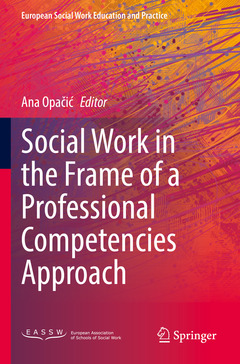Social Work in the Frame of a Professional Competencies Approach, 1st ed. 2022 European Social Work Education and Practice Series
Coordonnateur : Opačić Ana

- Part I: Understanding a Professional Competencies Approach, including Criticisms of the Competency-Based Education Approach
- Part II: Major Areas of Professional Competencies, including Leadership and Professional Socialisation
- Part III: Measuring Professional Competencies and Education Outcomes, including How to Conceptualise, Operationalise and Measure Professional Competencies in Social Work
- Part IV: Professional Competencies and Professional Development, including A Model of Holistic Competence in Social Work and the unique Professional Capabilities Framework
Ana Opačić, PhD, is an associate professor at the Social Work Study Center, Faculty of Law, University of Zagreb in Croatia. She was a project leader on a collaborative research project ˝Social Work in Social Welfare Centers in the Republic of Croatia˝ in which the aim was to develop, measure and validate a national framework of professional competencies. She has more than 10 years of experience in teaching theory of social work at the baccalaureate, master’s and postgraduate doctorate levels. She is one of the authors of the university textbook Theory of Social Work and author of many articles about social work in domestic and international peer-reviewed journals.
Ana Opačić is very active in professional associations, namely Croatian Chamber of Social Workers and Croatian Association of Social Workers. She is engaged in statutory bodies dealing with professional standards and competencies in social work.
Date de parution : 10-2023
Ouvrage de 204 p.
15.5x23.5 cm
Date de parution : 10-2022
Ouvrage de 204 p.
15.5x23.5 cm
Thème de Social Work in the Frame of a Professional Competencies... :
Mots-clés :
social work competencies; professional competence framework for social change; competency-based education (CBE); research instrument for measuring professional competencies; social work identity; evaluation self-efficacy scale; knowledge-base for social work; evaluation of field practice; evaluation of education programs in social work; education outcomes in social work; meta-competencies in social work; process competencies in social work; career development in social work; professional development in social work; professional socialization in social work; social work leadership; social work education outcomes; holistic competence in social work; professional capabilities framework (PCF) for social workers; pedagogical methods in social work
